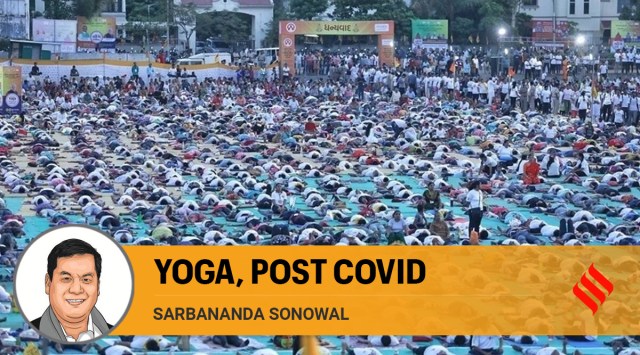
The post-Covid world faces several dilemmas. The rising tide of parochialism threatens to engulf humanity while depression, anxiety and innumerable physical and mental diseases have affected the well-being of people around the world. The World Health Organisation estimates that nearly 280 million people are suffering from depression.
In such a restive milieu, yoga can bring us together, help us to learn from each other’s experiences and address our shortcomings. In 2020, when the world was in the grip of the pandemic, researchers from the Harvard Medical School published an article, “Coping with coronavirus anxiety”. It highlighted how yoga and meditation can help one stay calm in an increasingly tense environment. Yoga helps in elevating the levels of a chemical called gamma-aminobutyric acid (GABA) which is associated with better mood and decreased anxiety. Researchers around the world agree that yoga therapies play a key role in improving the quality of life by significantly reducing symptoms linked to depression, boosting immunity, improving cardiovascular functioning, and enhancing sleep patterns.
Ancient texts also elucidate the importance of yoga. In the second chapter of the Bhagwat Gita, Lord Krishna asks Arjuna to perform his duties without flinching as if he was in a state of yoga. Krishna seems to see yoga as a state of mindfulness under all circumstances. Yoga fundamentally means letting the virtues of godliness and spirituality permeate one’s mind — it’s about self-realisation and the ability to merge one’s mind with the soul. Buddhist Dhamma also talks about qualities such as patience, self-control, tolerance, and understanding — these, according to Dhamma, are qualities that make virtuous rulers. Yoga can help people constantly improve themselves.
A healthy mind forms the nucleus of a harmonious community. Yoga can not only help us improve our mental health but also help us become karma yogis; a community of karma yogis is one where every member performs his or her duty while maintaining equanimity under all circumstances. Yoga can also spark creativity, which can, in turn, enhance one’s self-esteem and improve focus. A community of karma yogis could, therefore, help the world become a more peaceful place. In a sense, therefore, yoga has the potential to spark a revolution that lifts us out of our miseries.
Apart from healing the mind, yoga also heals the body. It helps in relieving back pain and easing the symptoms of arthritis. Yoga also helps in improving strength, balance, and flexibility.
India has already taken the first step in sowing the seeds for a peaceful community. The recently inaugurated Global Centre for Traditional Medicine (GCTM) in Jamnagar, Gujarat, is a collaboration between the World Health Organisation (WHO) and the Government of India. It seeks to deepen research in the field of traditional medicines and practices, including yoga. A Yoga Certification Board (YCB) has been established with the objectives of bringing synergy, quality, and uniformity in the knowledge and skills of yoga professionals across the world. This dovetails with the vision and mission of the Morarji Desai National Institute of Yoga, under the Ministry of Ayush: ”Health, harmony and happiness for all through yoga”.
Through the celebration of the International Day of Yoga 2022, the Ministry of Ayush aims to make the traditional practice of yoga go global. Such initiatives promote the sacredness of yoga cutting across the barriers of race, caste, religion, gender, and class. The promotion of yoga is also aligned with Sustainable Development Goal number 3 of ensuring healthy lives.
Today, a peaceful self and a harmonious world appear to be difficult goals. However, by making conscious efforts toward self-improvement, we can contribute towards the collective good. Using yoga as a tool for self-improvement would be a step towards a calmer, more compassionate world.
(The writer is Union minister for Ayush and Ports, Shipping & Waterways)